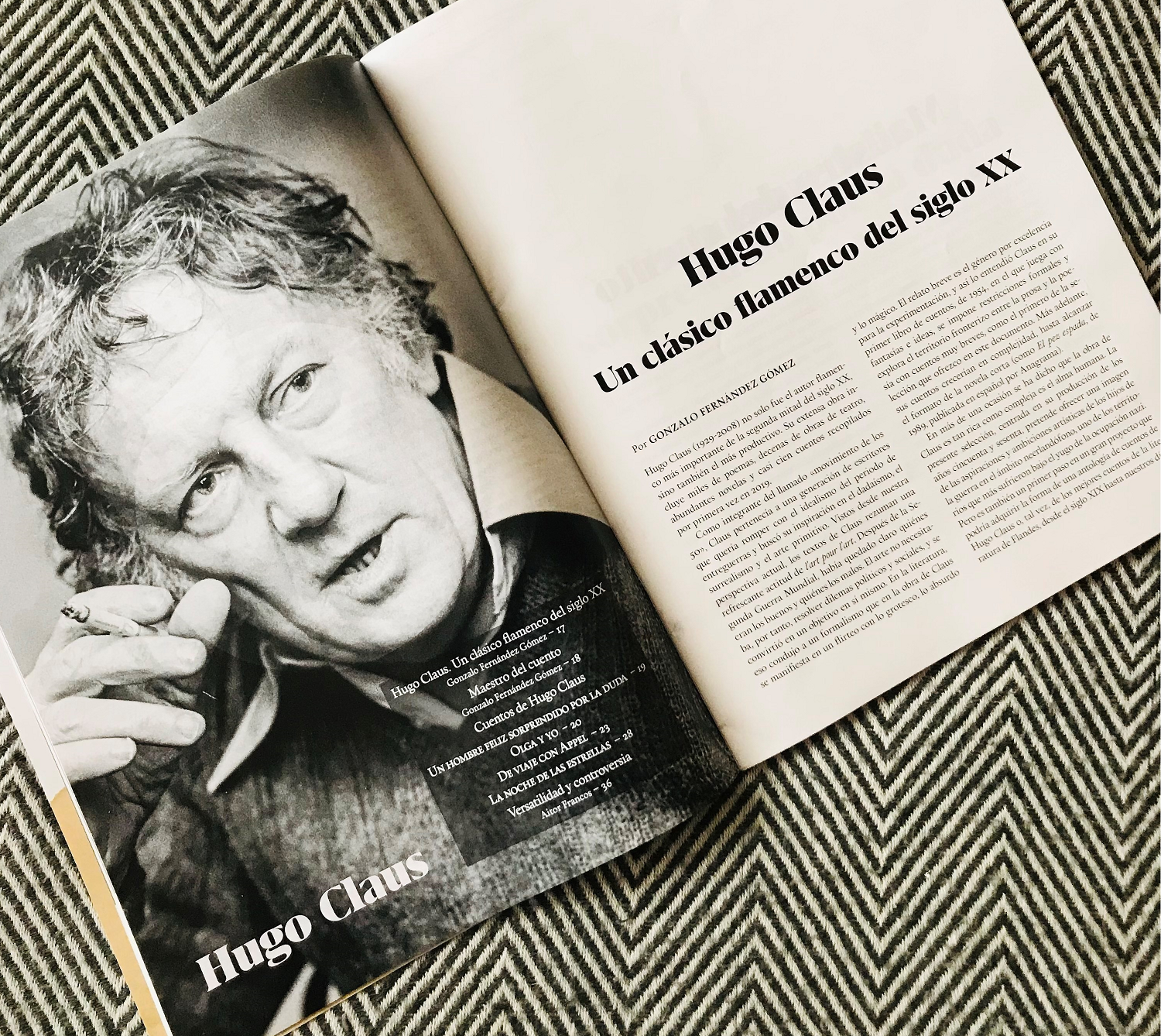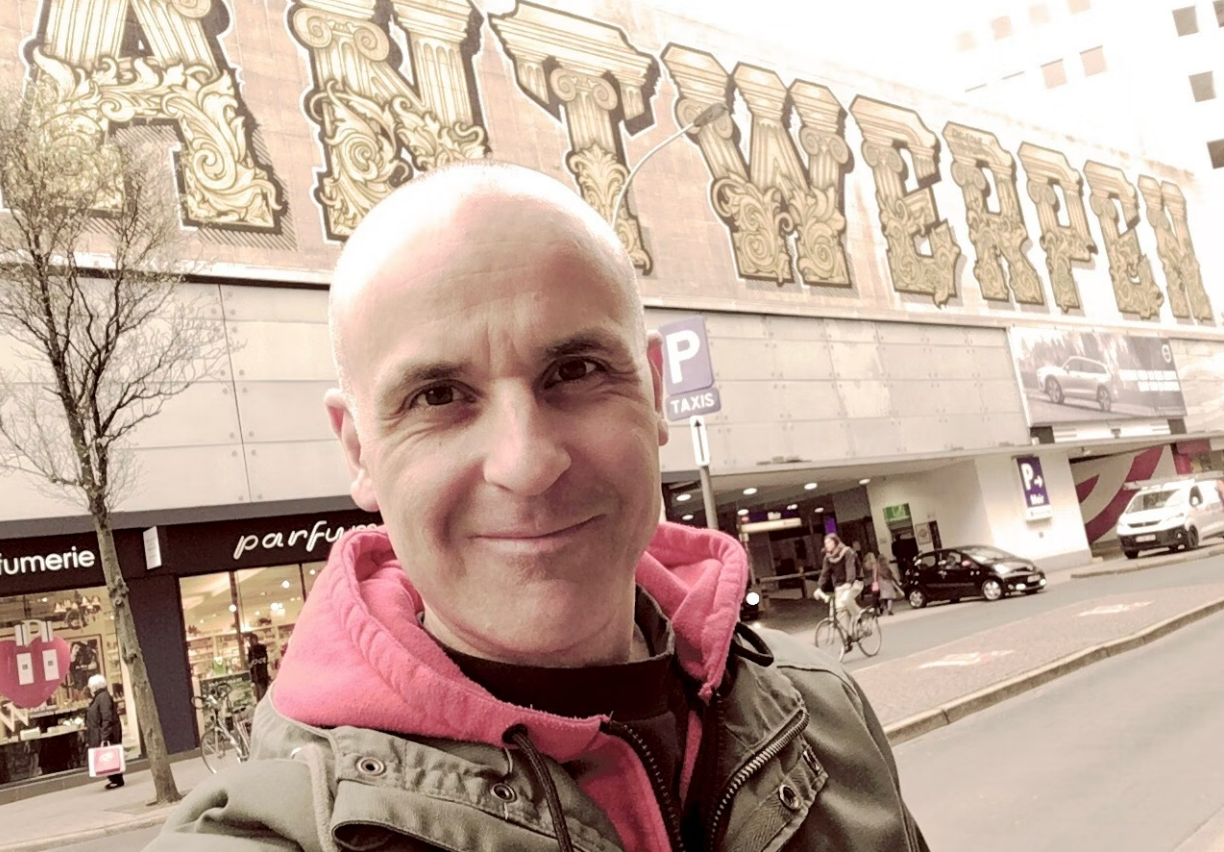‘At first every foreign language is a kind of code, a cuneiform script.’
In February 2022 the cover of ‘Quimera’, a Spanish magazine about literature, featured a black-and-white photograph of the young Hugo Claus. Five of the author’s short stories – cuentos – took up a third of the magazine. The reason? A translated extract from the short story collection ‘Alle verhalen’ in 2020 by Gonzalo Fernández Gómez. The literary translator was therefore the link, as is often the case.

Hugo Claus is a household name in Flemish literature. Does the same apply to the Spanish literature sector?
Claus is definitely well known and therefore rewarding to work on. Also, I’m a fan of the short story genre. But to be honest I miscalculated when it came to ‘Alle verhalen’. There are a lot of experimental pieces in that collection, from the author’s younger years. They are less relevant for the Spanish market, so there was no direct prospect of publishing the whole book. Furthermore, some of the stories are from the immediate post-war period. The social democrats had won, there was nothing more to fight for, and art responded with ‘art for art’s sake’. Many of the experiments that flowed from that are no longer interesting today, or could even be regarded as failures. With the special issue of ‘Quimera’ I took a first step towards a possible anthology.
Do you often take the initiative with work that you like?
As I’ve gone along, I’ve learnt that I need to do that to stay motivated. Translating a whole book generally takes several months and I often describe it as an emotional process. That’s rewarding if you’re enthusiastic. At first I accepted all the jobs I could get, but that resulted in a lot of translation work that I couldn’t get behind one hundred per cent. Five years ago or more I was suddenly given the chance, with the help of Flanders Literature, to translate an excerpt from ‘War and Turpentine’ by Stefan Hertmans. I knew for certain then: this is where my heart lies. It was a while before the rights were sold to Anagrama, but thanks to Elise of Flanders Literature and my own efforts we succeeded. That translation was a turning point for me.
I truly do this job out of 'goesting', 'gusto' – what a wonderful Flemish word that is – and not for the money.Gonzalo Fernández Gómez
Your redesigned website is bursting with love of literature. You explicitly mention that you dedicate yourself ‘to the dissemination of high-quality Dutch and Flemish literature in the Spanish-speaking world’. Where does that deliberate wording come from?
I truly do this job out of goesting, gusto – what a wonderful Flemish word that is incidentally – and not for the money. I want to build bridges between our cultures, but the content I’m working on always has to speak to me, hence that conscious choice for what I define as ‘high-quality literature’. I was born in Madrid, but I moved to the Netherlands in 2001. My family still lives in Spain and I try to go back there several times a year. Sometimes my trip coincides with a Dutch-language author’s foreign tour, and when I’m visiting I always try to call on a few publishers. The Spanish literary world is mainly concentrated in Barcelona, and I love travelling there, but in recent years Madrid has been keeping pace.

Imagine that tomorrow you had to choose between fiction and nonfiction. Which genre do you prefer?
That’s a difficult question. At the moment I’m staying in the Translators’ House applying all my energies to the biography of Pieter Bruegel by Leen Huet, and I learn an immense amount from that kind of work. Nonfiction is often clear and not subject to interpretation. The challenge lies mainly in the research you do for the translation, which you then incorporate into footnotes. With fiction there’s more latitude in terms of language – as regards sound, rhythm, old or contemporary Spanish – at least that’s how I see it. There are some literary translators who believe you need to transpose literally word by word and you can permit yourself only a little creativity. In any case I’m happy with the variation between genres, but what counts for me is above all the quality of the content.
I’d like to learn Russian, precisely because it’s a language that uses different letters and sounds. Or German, purely and simply to be able to read Kafka in the original.Gonzalo Fernández Gómez
Is there enough time left for reading as a leisure pursuit?
Sadly that’s not necessarily the case, although I do love to read. Have done ever since I was a child. The first book that made a deep impression on me was ‘The Neverending Story’ by Michael Ende. That was my ‘Harry Potter’. I was about twelve years old and completely immersed in Ende’s fantasy world, enjoying his use of language. In my adolescence the same feeling came over me again with Franz Kafka’s ‘The Metamorphosis’. After the opening scene, in which the central character wakes up as an insect, a stream of thoughts follows that’s powerful both philosophically and aesthetically, and it broadened my horizons. Right now I’m captivated by a Spanish author, Javier Marías, whose work has been translated into forty languages. His style is inimitable and I feel I can lose myself in his books the way I used to. Over the years, probably as a result of my profession, that becomes less easy.
But to come back to ‘The Neverending Story’ for a moment, of course I read it in Spanish, somewhere in the 1980s. Afterwards I learnt that it was translated by Miguel Sáenz, who later became the first translator ever to be accepted as a member of the Real Academia Española. That’s just about the most prestigious distinction possible for someone who occupies themselves with language in the Spanish-speaking world. It is extraordinary that a translator was regarded as eligible. To me that shows at least that at an early age I had a feeling for smooth, readable translations.
On your website you quote Eduardo Mendoza, former translator and famous author: ‘Es posible que el paraíso sea un lugar donde puedes estar con tus diccionarios, con tu té, con un ordenador que no se cuelga y la perspectiva de ir traduciendo, sin prisas, durante toda la eternidad.’ Do you want to become old like that?
(It’s possible that paradise is a place where you can be with your dictionaries, with your tea, with a computer that doesn’t freeze and the prospect of being able to translate for eternity without having to hurry.)
I recognize myself in what he says completely. I’ve been following Mendoza since my early teens. He was my literary idol in those days. Mendoza is known as the author of ‘The City of Marvels’, among other books. Before he became a writer, he worked as a translator for the United Nations. In an interview he once said that ideally he’d like to learn a new language every year. I understand that. I remember the pleasure of decoding Dutch when I came to the Netherlands. At first every foreign language is a kind of code, a cuneiform script. I’d like to learn Russian, for example, precisely because it’s a language that uses other letters and sounds. Or German, purely and simply to be able to read Kafka in the original.
Gonzalo Fernández Gómez (b. 1972) translates fiction, nonfiction and children’s and youth books into Spanish. His translations include ‘War and Turpentine’ by Stefan Hertmans, ‘Woesten’ by Kris Van Steenberge, ‘At Home in Music’ by Alicja Gescinska, and 'How the World Functions Perfectly Without Me and Mass by Joost Vandecasteele.